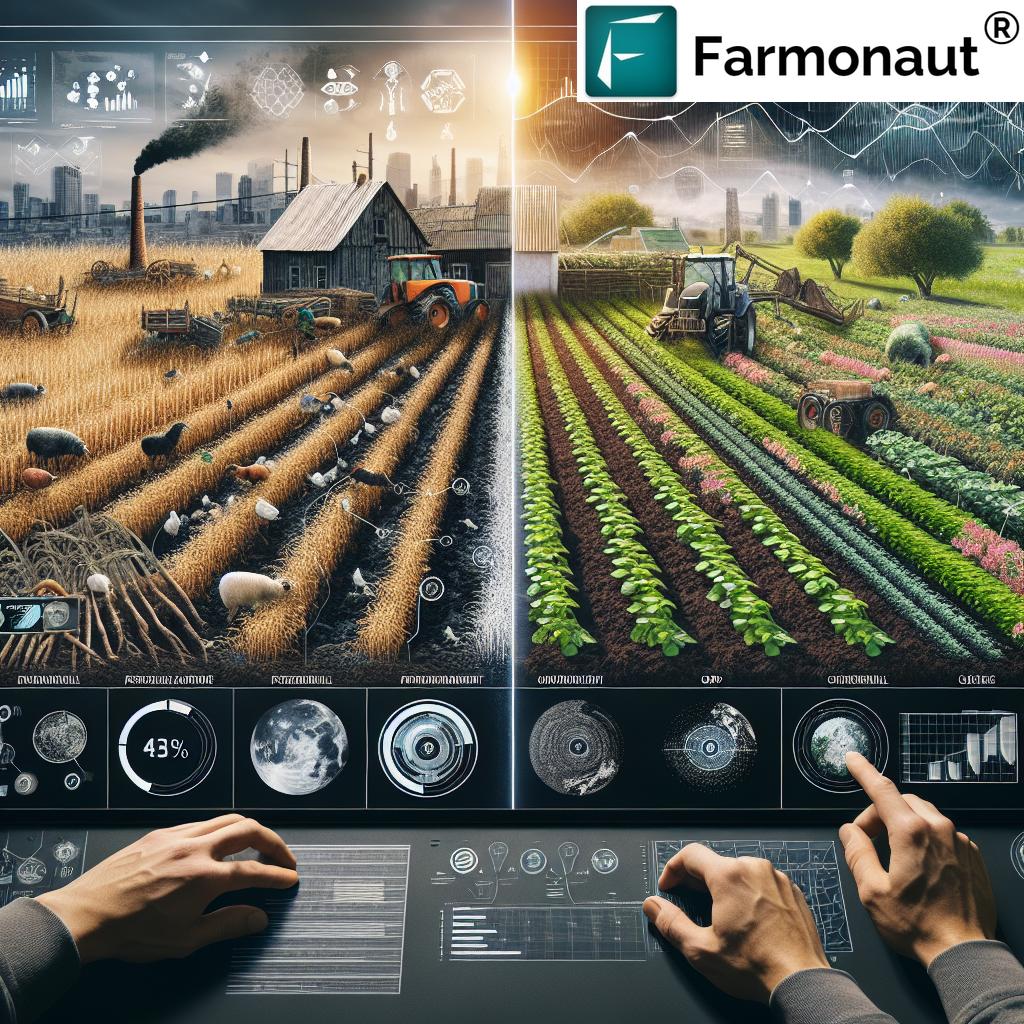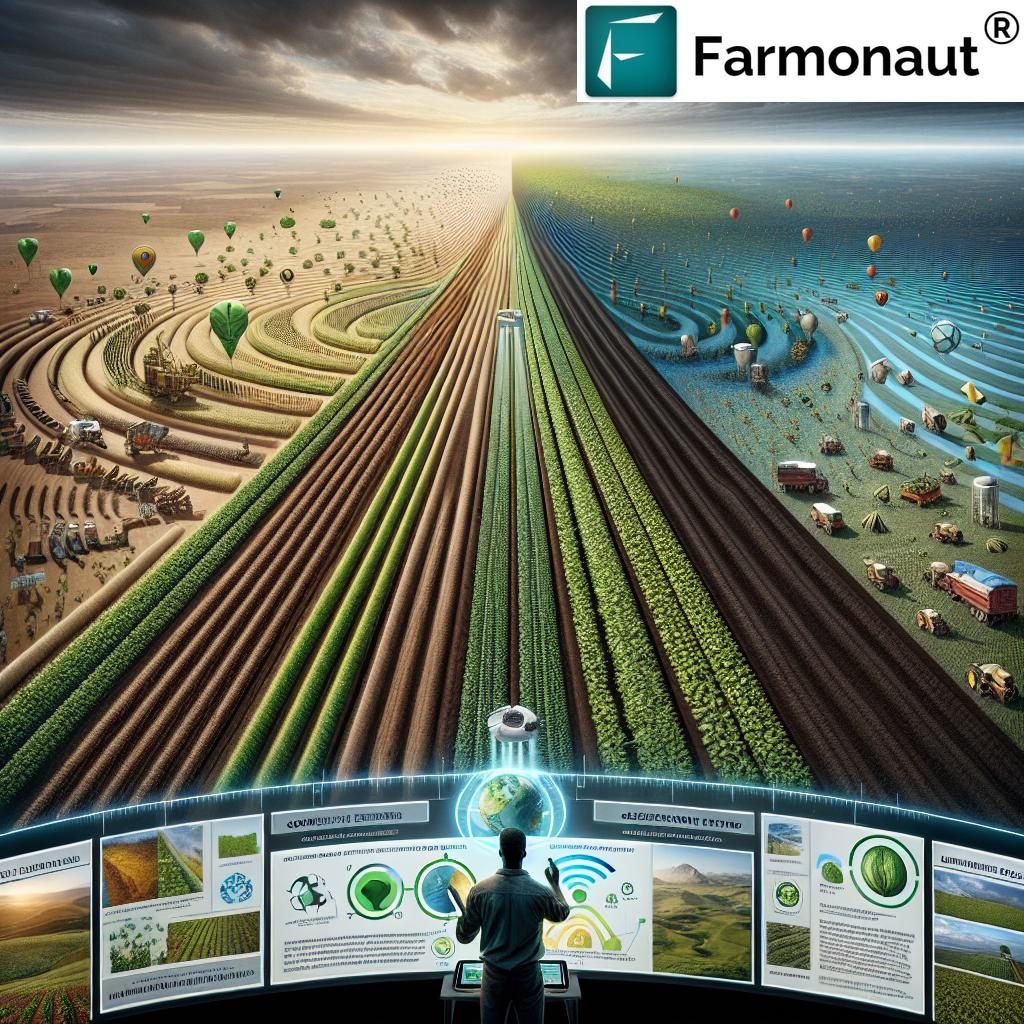Revolutionizing Climate Resilience: How Farmonaut’s Precision Agriculture Tools Drive Sustainable Farming Practices
“The Cooperative Extension System has been addressing climate challenges for over 100 years, since its establishment in 1914.”
As we celebrate Earth Day and reflect on the pressing need for climate change solutions, we find ourselves at a critical juncture in the history of agriculture and environmental stewardship. The evolution of farming practices from traditional methods to precision agriculture has been nothing short of revolutionary. In this comprehensive exploration, we’ll delve into how cutting-edge technologies and innovative approaches are shaping the future of sustainable farming, with a particular focus on the role of Farmonaut’s precision agriculture tools in driving climate resilience.
The Journey from Grassroots to Global Action
The roots of environmental stewardship in agriculture run deep, tracing back to the early 20th century when the Cooperative Extension System was established. This pivotal program, born out of a partnership between land-grant universities and the USDA, has been at the forefront of addressing climate challenges and promoting sustainable farming practices for over a century.
Today, the movement for climate action has grown from these grassroots beginnings into a global initiative, encompassing a wide range of stakeholders from individual farmers to international organizations. The urgency of our changing climate has catalyzed innovation in agricultural technology, pushing the boundaries of what’s possible in sustainable farming.

The Rise of Precision Agriculture
Precision agriculture represents a paradigm shift in farming practices, leveraging advanced technologies to optimize resource use, enhance crop yields, and minimize environmental impact. At the heart of this revolution are tools that provide farmers with unprecedented insights into their land and crops.
- Satellite Imagery: Enables real-time monitoring of crop health and soil conditions across vast areas.
- AI and Machine Learning: Analyze complex data sets to provide actionable insights and predictions.
- IoT Sensors: Collect granular data on soil moisture, temperature, and nutrient levels.
- Drone Technology: Offers high-resolution aerial imagery for detailed crop analysis.
These technologies, working in concert, allow farmers to make data-driven decisions that not only improve productivity but also promote sustainability and climate resilience.
Farmonaut: Pioneering Sustainable Farming Solutions
In the landscape of agricultural technology, Farmonaut stands out as a pioneer in providing accessible and affordable precision agriculture solutions. Through its innovative platform, Farmonaut is empowering farmers worldwide to adopt sustainable practices and contribute to climate resilience.
Key Features of Farmonaut’s Platform:
- Satellite-Based Crop Health Monitoring
- AI-Powered Advisory System (Jeevn AI)
- Blockchain-Based Product Traceability
- Fleet and Resource Management Tools
- Carbon Footprint Tracking
By integrating these advanced technologies, Farmonaut is not just offering tools; it’s providing a comprehensive ecosystem for sustainable farming. The platform’s user-friendly interface makes it accessible to farmers of all scales, from small-holders to large agribusinesses.
Explore Farmonaut’s solutions:
The Impact of Precision Agriculture on Climate Resilience
The adoption of precision agriculture tools, such as those offered by Farmonaut, is having a profound impact on climate resilience in farming. Let’s explore some of the key areas where these technologies are making a difference:
1. Water Conservation
“Precision agriculture tools can reduce water usage by up to 30% while maintaining or improving crop yields.”
Water scarcity is one of the most pressing challenges facing agriculture in the era of climate change. Precision irrigation systems, informed by satellite imagery and soil moisture sensors, allow farmers to apply water exactly where and when it’s needed. This not only conserves water but also reduces energy consumption associated with pumping and distribution.
2. Soil Health Management
Healthy soils are crucial for both agricultural productivity and carbon sequestration. Farmonaut’s platform provides detailed insights into soil health, enabling farmers to make informed decisions about nutrient management, tillage practices, and crop rotation. By promoting practices that enhance soil organic matter, these tools contribute to both climate mitigation and adaptation.
3. Reducing Greenhouse Gas Emissions
Precision agriculture plays a crucial role in minimizing the carbon footprint of farming operations. By optimizing inputs such as fertilizers and pesticides, these technologies help reduce nitrous oxide emissions from soils and carbon dioxide emissions from machinery. Farmonaut’s carbon footprint tracking feature allows farmers to monitor and actively reduce their emissions over time.
4. Enhancing Biodiversity and Pollinator Protection
The precise application of agricultural inputs enabled by Farmonaut’s technology helps minimize the impact on non-target species, including beneficial insects and pollinators. By promoting more targeted pest management strategies, these tools support the preservation of biodiversity in agricultural landscapes.
The Role of Cooperative Extension in Climate Action
The Cooperative Extension System continues to play a vital role in addressing climate challenges and promoting sustainable agriculture. Through a network of educators, researchers, and community leaders, Extension programs are at the forefront of:
- Developing and disseminating climate-smart agricultural practices
- Providing technical advising on sustainable farming methods
- Conducting research on climate impacts and adaptation strategies
- Offering educational programs on environmental stewardship
The collaboration between Extension services and technology providers like Farmonaut creates a powerful synergy, combining on-the-ground expertise with cutting-edge tools to drive innovation in sustainable farming.

Innovative Projects and Initiatives
Across the globe, numerous projects and initiatives are leveraging precision agriculture tools to address climate challenges. Here are a few notable examples:
- Climate-Smart Agriculture Programs: Integrating Farmonaut’s satellite monitoring capabilities to track and improve the effectiveness of climate-adaptive farming practices.
- Soil Health Initiatives: Using AI-powered soil analysis to develop tailored strategies for enhancing soil carbon sequestration.
- Precision Conservation: Employing high-resolution mapping to identify and protect critical environmental areas within agricultural landscapes.
- Smart Water Management Projects: Implementing Farmonaut’s satellite-based moisture monitoring to optimize irrigation across large watersheds.
These initiatives demonstrate the practical applications of precision agriculture in driving sustainable farming practices and building climate resilience.
The Future of Climate-Resilient Agriculture
As we look to the future, the integration of precision agriculture tools like those offered by Farmonaut will be crucial in building a more resilient and sustainable food system. Here are some emerging trends and opportunities:
- AI-Driven Predictive Analytics: Advanced algorithms will provide increasingly accurate forecasts of climate impacts on crop yields, enabling proactive adaptation strategies.
- Blockchain for Sustainable Supply Chains: Farmonaut’s blockchain-based traceability solutions will play a key role in ensuring transparency and sustainability throughout the agricultural value chain.
- Integration of Remote Sensing and Ground-Based Sensors: The combination of satellite imagery with IoT devices will provide an unprecedented level of detail in monitoring and managing agricultural ecosystems.
- Precision Carbon Markets: As carbon markets mature, tools for precise measurement and verification of agricultural carbon sequestration will become increasingly valuable.
These advancements promise to further enhance our ability to adapt to changing climate conditions while minimizing agriculture’s environmental footprint.
Climate-Smart Agriculture Technologies and Their Impact
| Technology | Description | Environmental Benefits | Estimated Impact on Sustainability (%) |
|---|---|---|---|
| Satellite Imagery | High-resolution monitoring of crop health and field conditions | Optimized resource use, reduced chemical inputs | 20-30% |
| Soil Sensors | Real-time monitoring of soil moisture and nutrient levels | Improved water management, reduced fertilizer runoff | 15-25% |
| Weather Stations | Localized weather data for precise forecasting | Enhanced climate resilience, optimized planting and harvesting | 10-20% |
| Crop Monitoring Systems | AI-powered analysis of crop growth and health | Early pest detection, reduced pesticide use | 25-35% |
| Precision Irrigation | Variable-rate water application based on crop needs | Significant water conservation, reduced energy use | 30-40% |
This table illustrates the significant impact that precision agriculture technologies can have on sustainable farming practices. By leveraging these tools, farmers can dramatically reduce their environmental footprint while improving productivity and resilience to climate change.
Empowering Farmers with Data-Driven Insights
One of the most powerful aspects of Farmonaut’s platform is its ability to transform complex data into actionable insights for farmers. By providing easy-to-understand visualizations and recommendations, Farmonaut enables farmers of all technical backgrounds to make informed decisions that benefit both their operations and the environment.
Key Benefits of Farmonaut’s Data-Driven Approach:
- Early detection of crop stress and disease outbreaks
- Optimization of input application timing and quantity
- Improved yield forecasting and harvest planning
- Enhanced ability to adapt to changing weather patterns
For farmers looking to leverage these insights, Farmonaut offers flexible access options through its web application, as well as dedicated Android and iOS apps.
The Role of Policy and Partnerships
While technological solutions like those offered by Farmonaut are crucial, addressing climate challenges in agriculture also requires supportive policies and strong partnerships. Key areas of focus include:
- Incentivizing Sustainable Practices: Policies that reward farmers for adopting climate-smart technologies and practices.
- Research and Development Funding: Increased investment in agricultural research to develop new climate-resilient crop varieties and farming techniques.
- Education and Training Programs: Expanding access to training on precision agriculture tools and sustainable farming methods.
- Public-Private Partnerships: Collaborations between government agencies, research institutions, and technology providers to accelerate innovation and adoption of sustainable practices.
By creating an enabling environment for sustainable agriculture, these initiatives can amplify the impact of precision agriculture tools in building climate resilience.
Conclusion: A Path Forward for Sustainable Agriculture
As we confront the challenges of climate change, the agricultural sector stands at a crossroads. The integration of precision agriculture tools, exemplified by Farmonaut’s innovative platform, offers a promising path toward a more sustainable and resilient food system. By harnessing the power of satellite technology, AI, and data analytics, we can transform farming practices to be more efficient, productive, and environmentally friendly.
The journey toward climate-resilient agriculture is a collaborative effort, requiring the engagement of farmers, researchers, policymakers, and technology providers. As we continue to innovate and adapt, platforms like Farmonaut will play an increasingly vital role in shaping the future of sustainable farming.
This Earth Day, let us recommit to the principles of environmental stewardship and embrace the technologies that will help us build a more sustainable world. Together, we can cultivate a future where agriculture not only feeds the planet but also helps heal it.
Farmonaut Subscriptions
FAQ Section
Q: What is precision agriculture?
A: Precision agriculture is an approach to farm management that uses information technology and specialized equipment to optimize crop yields and reduce waste by tailoring inputs like water, fertilizer, and pesticides to specific areas of a field.
Q: How does Farmonaut contribute to sustainable farming?
A: Farmonaut provides farmers with satellite-based crop monitoring, AI-powered advisories, and resource management tools that enable more efficient use of water, fertilizers, and other inputs, thereby reducing environmental impact and promoting sustainability.
Q: Can small-scale farmers benefit from Farmonaut’s technology?
A: Yes, Farmonaut’s platform is designed to be accessible and affordable for farmers of all scales, including small-holders. The mobile app and web interface make it easy for farmers to access valuable insights without the need for expensive hardware.
Q: How does satellite imagery help in crop management?
A: Satellite imagery provides a comprehensive view of crop health, allowing farmers to identify issues like pest infestations, nutrient deficiencies, or water stress early on. This enables targeted interventions, reducing the need for broad-spectrum treatments.
Q: What role does AI play in Farmonaut’s agricultural solutions?
A: Farmonaut’s AI system, Jeevn AI, analyzes satellite data and other inputs to provide personalized recommendations for crop management. This includes insights on optimal planting times, irrigation schedules, and pest control strategies.
Q: How can farmers access Farmonaut’s services?
A: Farmers can access Farmonaut’s services through their web application, Android app, or iOS app. For developers and businesses looking to integrate Farmonaut’s data into their own systems, an API is also available.
For more information on integrating Farmonaut’s technology into your farming practices or agricultural projects, please refer to our API Developer Documentation.






